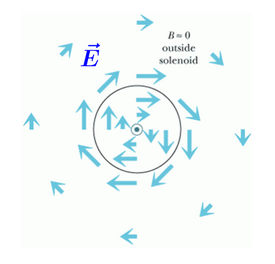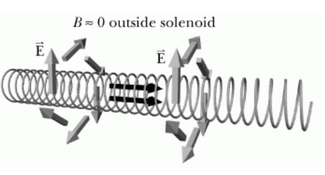Curly Electric Fields: Difference between revisions
Jump to navigation
Jump to search
No edit summary |
|||
| Line 7: | Line 7: | ||
However, in the situation where current in the solenoid is changing and magnetic force is thereby time-varying, a '''curly electric field''' can be observed. | However, in the situation where current in the solenoid is changing and magnetic force is thereby time-varying, a '''curly electric field''' can be observed. | ||
[[File:curlyefield2.png| | [[File:curlyefield2.png|275px|thumb|center|''The '''curly electric field''' curls around the axis of the solenoid'']] | ||
[[File:curlyefield1.png| | <!--{{spaces|2}}--> | ||
[[File:curlyefield1.png|325px|thumb|center|''Outside of the solenoid, magnetic field is still virtually zero, but the curly electric field can be observed both inside and outside of the solenoid'']] | |||
===Proportionality=== | ===Proportionality=== | ||
Revision as of 17:36, 1 December 2015
This topic is claimed by Miranda Fyfe.
Curly Electric Fields
In the case where current in a solenoid is constant and magnetic force is likewise constant in time, it can be observed that the magnetic and electric forces experienced by some moving charge outside the solenoid are essentially zero.
However, in the situation where current in the solenoid is changing and magnetic force is thereby time-varying, a curly electric field can be observed.


Proportionality
This electric field is proportional to the rate of change of the magnetic field (dB/dt).
Inside the solenoid
Curly electric field is proportional to distance from the solenoid axis, r.
Outside the solenoid
Curly electric field is proportional to 1/r, with the field decreasing as distance from the axis increases.